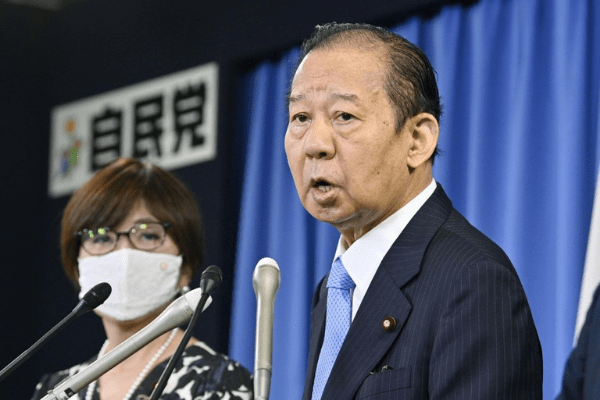The governing party in charge of Japan’s Olympic Committee is in hot water again, after it welcomed five women into a board-meeting but then told them they could only “look, don’t speak.”
According to Japanese media, the Liberal Democratic Party (LDP) proposed the five women to sit in as observers on decision-making board meetings but that they would not be allowed to contribute.
Instead, they were asked to submit their opinions to the secretariat office after the meeting. The LDP’s secretary general Toshihiro Nikai, told a news conference on Tuesday that his party wanted to invite female perspectives into meetings, which are chaired and attended by men.
Nikai acknowledged the widespread criticism his party has received for its gender-homogenous board and said it was important that female members of the LDP “look” at the decision-making process.
“It is important to fully understand what kind of discussions are happening. Take a look, is what it is about,” he said.
Currently, only two women sit on the 12-person board of the LDP.
Nikai’s comments come just days after Yoshiro Mori, the 2020 Tokyo Olympic and Paralympic Games organising committee president, was forced to resign after making sexist comments in a Japanese Olympic Committee meeting last Thursday.
The 83-year old former Prime Minister was quoted as saying in the meeting that “board of directors meetings with many women take a lot of time”.
“When you increase the number of female executive members, if their speaking time isn’t restricted to a certain extent, they have difficulty finishing, which is annoying,” More said, according to a translation by Agence France-Presse.
“We have to make sure their speaking time is restricted somewhat – they have difficulty finishing,” he said. Mori later apologised and resisted calls for him to resign.
“If my presence causes trouble, our efforts so far have been brought to nothing,” Mori said.
After a huge backlash however, he resigned the following day, and called his remarks, “inappropriate.”
Journalist Robin Harding of the Financial Times believes the sexist comments from Mori and Nikai are “ standard procedure for Japanese politicians.“
The latest public remarks made by these men have seen major Olympics sponsors, including Toyota, publicly condemning the comments.
Tokyo’s Governor, Yuriko Koike has come out to say she will not be attending a meeting of high-level Olympic officials in the future. A group of female politicians wore white to a House of Representatives session last week to protest the sexist remarks made by Mori. According to Kyodo News, the women wore white jackets with white roses attached to their lapels to honour the women of the suffragette movement in the U.S.
Roughly 400 people have apparently withdrawn their applications to volunteer at the Olympic games, which are set to take place later this year.
Local broadcaster, Fuji News Network (FNN), reported the government will now look for a younger, potentially female candidate to rehabilitate the reputation that’s been damaged.
“We can’t give the impression that things have changed unless we install a woman or see a generational shift,” FNN wrote.
The International Olympic Committee’s president, Thomas Bach, has come out to say he supports Mori’s decision.
“The IOC will continue working hand-in-hand with his successor to deliver a safe and secure Games,” he said.
In Japan, women make up just over half the population, yet only take up roughly 10 percent of Shugiin (the House of Representatives) seats. It has a low ranking on the World Economic Forum’s 2020 Global Gender Gap Index, coming in at number 121 in a list of 153 countries, and has a a 27.5 percent gender pay gap.
Two years ago, Forbes reported that Japan’s deficit of women leaders is a $750 billion problem.
“Not a single Nikkei 225 Index company (a stock market index for the Tokyo Stock Exchange) is run by a female Japanese CEO,” William Pesek wrote. “Japan’s gross domestic product would get a 15 percent boost if female labor participation rivalled that of men, or around 80 percent. Women are just under 70 percent.”
In 2018, it was revealed that one of Japan’s most prestigious medical schools had been deliberately altering entrance exam scores for more than a decade to restrict the number of female students and ensure more men went on to became doctors.


